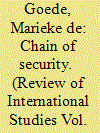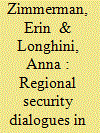|
|
|
Sort Order |
|
|
|
Items / Page
|
|
|
|
|
|
|
| Srl | Item |
| 1 |
ID:
157724


|
|
|
|
|
| Summary/Abstract |
Increasingly, private companies – including Twitter, airlines, and banks – find themselves in the frontline of fighting terrorism and other security threats, because they are obliged to mine and expel suspicious transactions. This analytical work of companies forms part of a chain, whereby transactions data are analysed, collected, reported, shared, and eventually deployed as a basis for intervention by police and prosecution. This article develops the notion of the Chain of Security in order to conceptualise the ways in which security judgements are made across public/private domains and on the basis of commercial transactions. Drawing on the work of Bruno Latour, this article understands the security chain as the set of practices whereby commercial transactions are collected, stored, transferred, and analysed, in order to arrive at security facts. Understanding the trajectory of the suspicious transaction as a series of translations across professional domains draws attention to the processes of sequencing, movement, and referral in the production of security judgements. The article uses the chain of financial suspicious transactions reporting as example to show how this research ‘thinking tool’ can work. In doing so, it aims to contribute to debates at the intersection between International Relations (IR) and Science-and-Technology Studies (STS).
|
|
|
|
|
|
|
|
|
|
|
|
|
|
|
|
| 2 |
ID:
181133


|
|
|
|
|
| Summary/Abstract |
The term regional security dialogue brings to mind state-organised conferences and events; however, an under-appreciated subset of such dialogues are organised by non-state actors that have unique formal aspects. These quasi-formal dialogues operate alongside, and sometimes in competition to, state-sanctioned processes. Why do some of these forums appear to be more effective at fostering regional dialogue than strictly formal or informal processes with the same goals? Drawing from heterogenous discourse approaches, we address this question by identifying and expanding the concept of the quality of discursive space, as a key feature for the success of security dialogues. We then apply this concept to two of the most successful so-called Track 1.5 security dialogues: the Munich Security Conference (MSC) in Europe and the Shangri-La Dialogue (SLD) in Asia. We analyse these cases using a mix of interviews with participants and organisers, participant observation, and public outputs with the aim of improving the understanding of the role and impact of Track 1.5 diplomacy in the practice of international security. Our findings highlight that it is what we call the quality of discursive space, as a mix of different components in this space, which differentiates effective dialogues from mere policy ‘talk shops’.
|
|
|
|
|
|
|
|
|
|
|
|
|
|
|
|
|
|
|
|
|